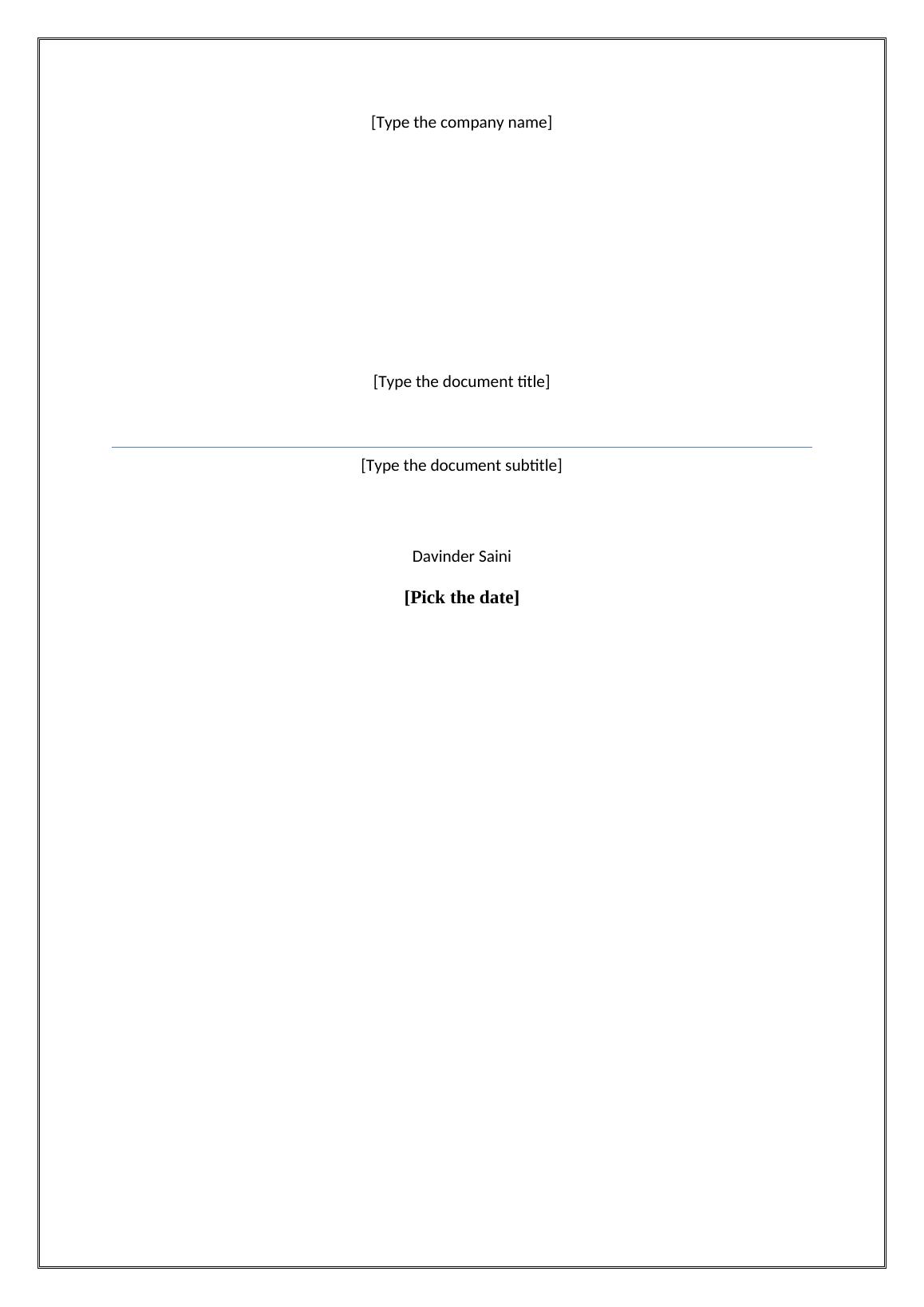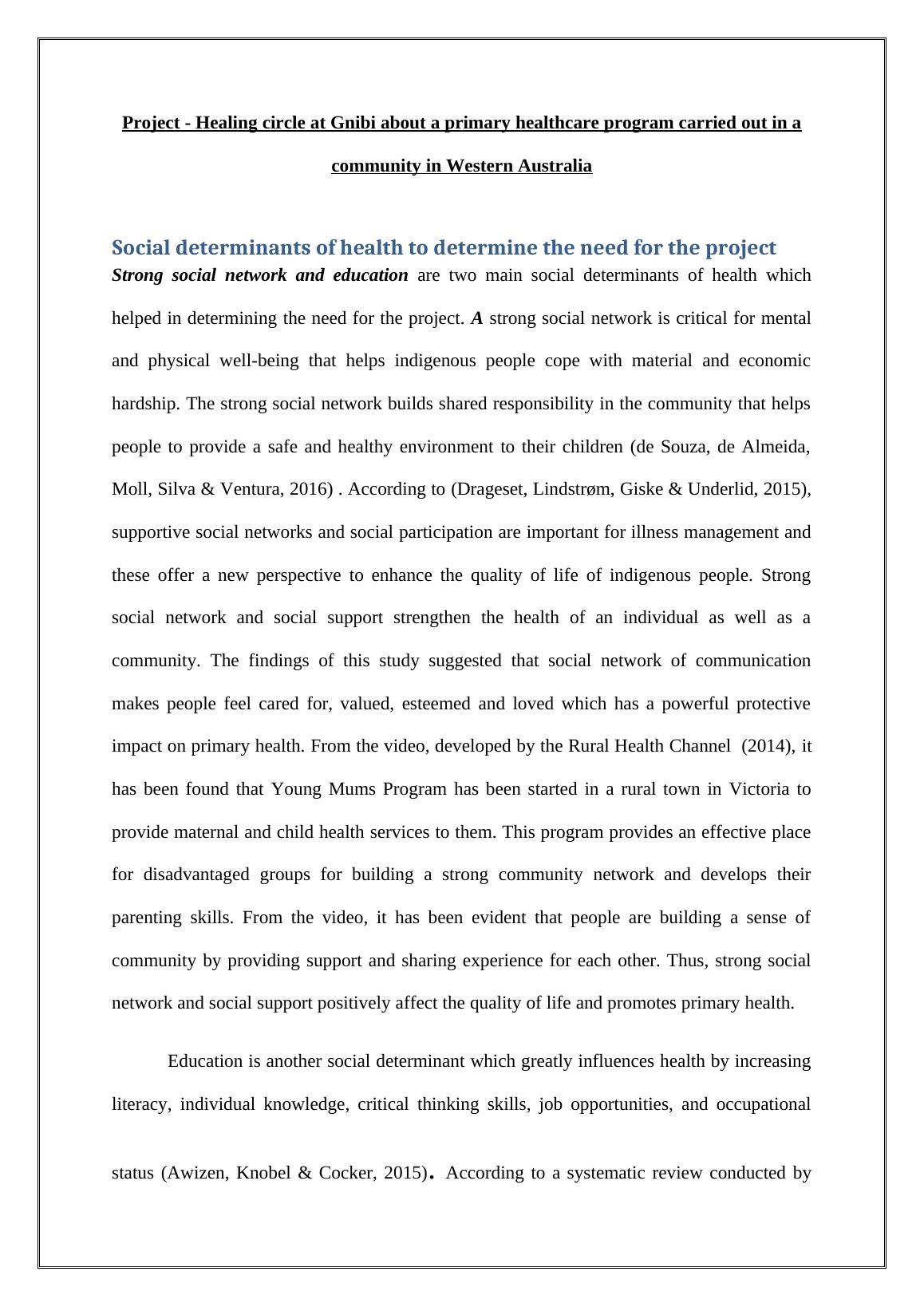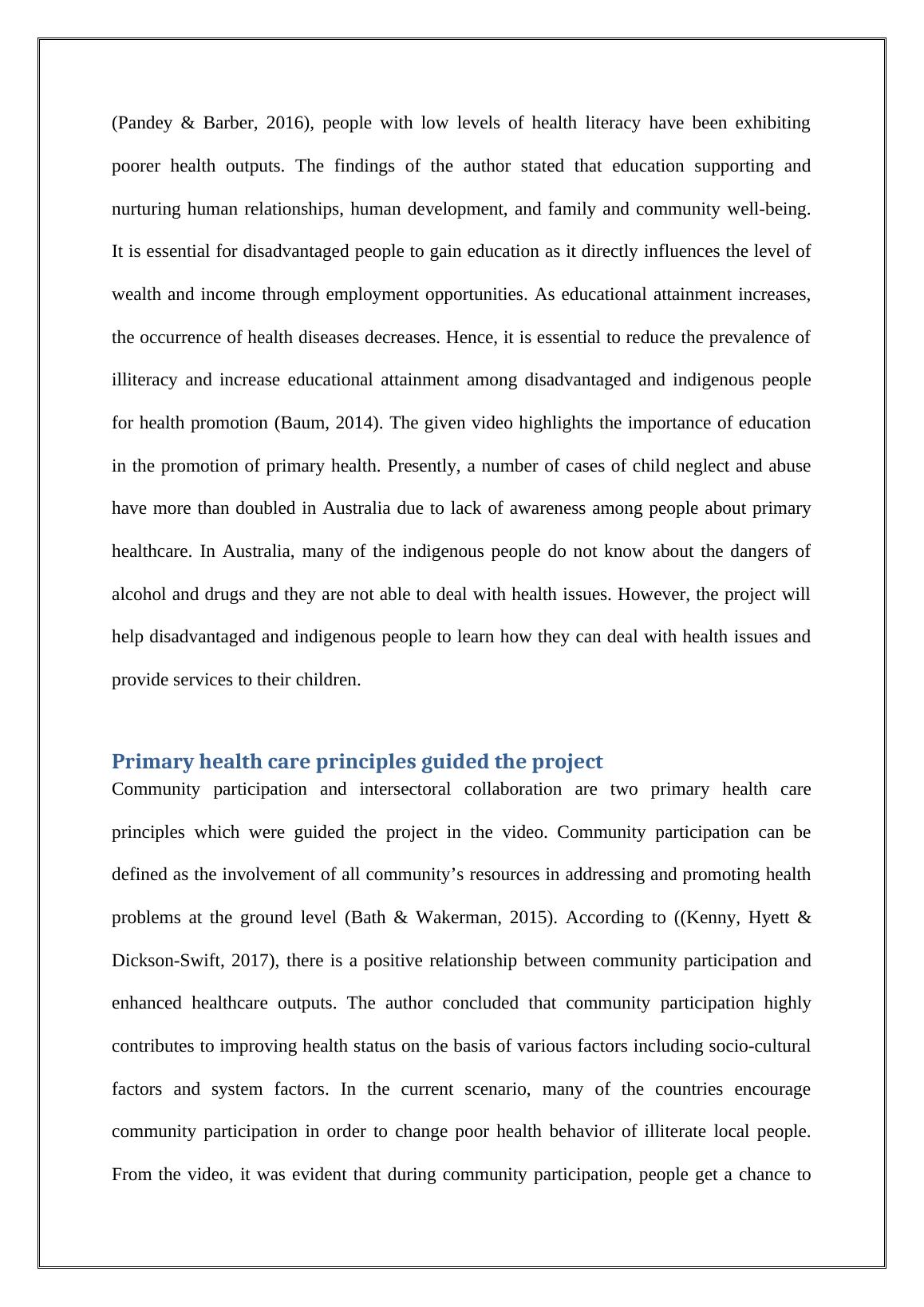Social Determinants of Health and Primary Healthcare Program in Western Australia
Added on 2023-01-20
9 Pages2579 Words97 Views
[Type the company name]
[Type the document title]
[Type the document subtitle]
Davinder Saini
[Pick the date]
[Type the document title]
[Type the document subtitle]
Davinder Saini
[Pick the date]

Project - Healing circle at Gnibi about a primary healthcare program carried out in a
community in Western Australia
Social determinants of health to determine the need for the project
Strong social network and education are two main social determinants of health which
helped in determining the need for the project. A strong social network is critical for mental
and physical well-being that helps indigenous people cope with material and economic
hardship. The strong social network builds shared responsibility in the community that helps
people to provide a safe and healthy environment to their children (de Souza, de Almeida,
Moll, Silva & Ventura, 2016) . According to (Drageset, Lindstrøm, Giske & Underlid, 2015),
supportive social networks and social participation are important for illness management and
these offer a new perspective to enhance the quality of life of indigenous people. Strong
social network and social support strengthen the health of an individual as well as a
community. The findings of this study suggested that social network of communication
makes people feel cared for, valued, esteemed and loved which has a powerful protective
impact on primary health. From the video, developed by the Rural Health Channel (2014), it
has been found that Young Mums Program has been started in a rural town in Victoria to
provide maternal and child health services to them. This program provides an effective place
for disadvantaged groups for building a strong community network and develops their
parenting skills. From the video, it has been evident that people are building a sense of
community by providing support and sharing experience for each other. Thus, strong social
network and social support positively affect the quality of life and promotes primary health.
Education is another social determinant which greatly influences health by increasing
literacy, individual knowledge, critical thinking skills, job opportunities, and occupational
status (Awizen, Knobel & Cocker, 2015). According to a systematic review conducted by
community in Western Australia
Social determinants of health to determine the need for the project
Strong social network and education are two main social determinants of health which
helped in determining the need for the project. A strong social network is critical for mental
and physical well-being that helps indigenous people cope with material and economic
hardship. The strong social network builds shared responsibility in the community that helps
people to provide a safe and healthy environment to their children (de Souza, de Almeida,
Moll, Silva & Ventura, 2016) . According to (Drageset, Lindstrøm, Giske & Underlid, 2015),
supportive social networks and social participation are important for illness management and
these offer a new perspective to enhance the quality of life of indigenous people. Strong
social network and social support strengthen the health of an individual as well as a
community. The findings of this study suggested that social network of communication
makes people feel cared for, valued, esteemed and loved which has a powerful protective
impact on primary health. From the video, developed by the Rural Health Channel (2014), it
has been found that Young Mums Program has been started in a rural town in Victoria to
provide maternal and child health services to them. This program provides an effective place
for disadvantaged groups for building a strong community network and develops their
parenting skills. From the video, it has been evident that people are building a sense of
community by providing support and sharing experience for each other. Thus, strong social
network and social support positively affect the quality of life and promotes primary health.
Education is another social determinant which greatly influences health by increasing
literacy, individual knowledge, critical thinking skills, job opportunities, and occupational
status (Awizen, Knobel & Cocker, 2015). According to a systematic review conducted by

(Pandey & Barber, 2016), people with low levels of health literacy have been exhibiting
poorer health outputs. The findings of the author stated that education supporting and
nurturing human relationships, human development, and family and community well-being.
It is essential for disadvantaged people to gain education as it directly influences the level of
wealth and income through employment opportunities. As educational attainment increases,
the occurrence of health diseases decreases. Hence, it is essential to reduce the prevalence of
illiteracy and increase educational attainment among disadvantaged and indigenous people
for health promotion (Baum, 2014). The given video highlights the importance of education
in the promotion of primary health. Presently, a number of cases of child neglect and abuse
have more than doubled in Australia due to lack of awareness among people about primary
healthcare. In Australia, many of the indigenous people do not know about the dangers of
alcohol and drugs and they are not able to deal with health issues. However, the project will
help disadvantaged and indigenous people to learn how they can deal with health issues and
provide services to their children.
Primary health care principles guided the project
Community participation and intersectoral collaboration are two primary health care
principles which were guided the project in the video. Community participation can be
defined as the involvement of all community’s resources in addressing and promoting health
problems at the ground level (Bath & Wakerman, 2015). According to ((Kenny, Hyett &
Dickson-Swift, 2017), there is a positive relationship between community participation and
enhanced healthcare outputs. The author concluded that community participation highly
contributes to improving health status on the basis of various factors including socio-cultural
factors and system factors. In the current scenario, many of the countries encourage
community participation in order to change poor health behavior of illiterate local people.
From the video, it was evident that during community participation, people get a chance to
poorer health outputs. The findings of the author stated that education supporting and
nurturing human relationships, human development, and family and community well-being.
It is essential for disadvantaged people to gain education as it directly influences the level of
wealth and income through employment opportunities. As educational attainment increases,
the occurrence of health diseases decreases. Hence, it is essential to reduce the prevalence of
illiteracy and increase educational attainment among disadvantaged and indigenous people
for health promotion (Baum, 2014). The given video highlights the importance of education
in the promotion of primary health. Presently, a number of cases of child neglect and abuse
have more than doubled in Australia due to lack of awareness among people about primary
healthcare. In Australia, many of the indigenous people do not know about the dangers of
alcohol and drugs and they are not able to deal with health issues. However, the project will
help disadvantaged and indigenous people to learn how they can deal with health issues and
provide services to their children.
Primary health care principles guided the project
Community participation and intersectoral collaboration are two primary health care
principles which were guided the project in the video. Community participation can be
defined as the involvement of all community’s resources in addressing and promoting health
problems at the ground level (Bath & Wakerman, 2015). According to ((Kenny, Hyett &
Dickson-Swift, 2017), there is a positive relationship between community participation and
enhanced healthcare outputs. The author concluded that community participation highly
contributes to improving health status on the basis of various factors including socio-cultural
factors and system factors. In the current scenario, many of the countries encourage
community participation in order to change poor health behavior of illiterate local people.
From the video, it was evident that during community participation, people get a chance to

End of preview
Want to access all the pages? Upload your documents or become a member.
Related Documents
Primary Healthcare in Actionlg...
|7
|1809
|37
Primary Health Care in Actionlg...
|10
|2358
|207
Primary Health Care in Action: Social Determinants, Principles, and Cultural Competencelg...
|10
|2334
|102
Primary Health Care in Actionlg...
|10
|2641
|482
Child Abuse and Lack of Social Connection: A Critical Issue in Australialg...
|9
|2363
|388
Primary Health Care and Social Determinants of Healthlg...
|9
|2042
|394
